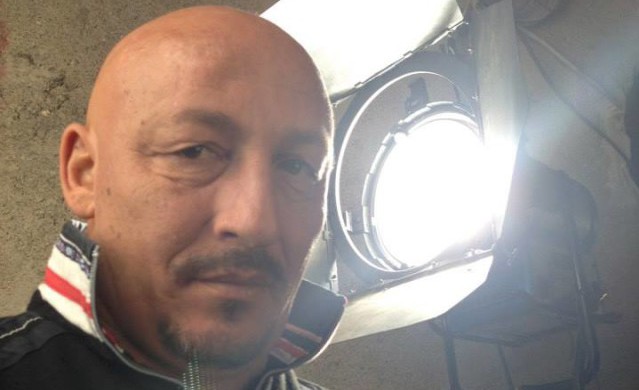When many of us Italian-Americans imagine our families back in Italy, we have visions of beautiful, welcoming people filled with warmth and enthusiasm. Since all of my great-grandparents came from the regions of Basilicata, Calabria and Sicily, I have a special affection for the south. My paternal great grandfather came from Calabria, so I naturally consider all Calabrese warm and full of love and compassion like him and his children; my grandfather and great aunts. Well that is exactly what I found when I contacted “Anime nere” (Black Souls) cast member, Stefano Priolo for an interview about his beloved town, Africo, the town in which the film was made. He spent hours telling me about Africo, and even went to the sea to take pictures for me. It was an overcast day but as you will see in one of the photos below, the Ionian Sea and its landscapes are beautiful in any light whether it be sun or shadows.
Although you’d never know it by watching his performance, Priolo is not a trained actor. He’s a longtime friend of Gioacchino Criaco, the author of the novel,“Anime nere” from which the film was adapted. “I was walking with some friends in the square where our Catholic church is located”, explained Priolo. “There, I saw my friend with a man I didn’t know, who ended up being the director, Francesco Munzi. He was fascinated by my face and gestures while I was talking with friends, and he asked me to audition for the part. He loved my audition, so I got a part in this film the whole world has come to appreciate.” Priolo owns a restaurant in Africo, called La Ginestra. There, he serves traditional culinary dishes, such as boiled goat meat with red onion, which was handed down by the ancient shepherds. If you’re vegetarian like me, he’ll make you a pasta dish made with wild fennel, “light as a feather” according to Priolo.
Located in the commune of Reggio Calabria at the tip of southern Italy, Africo consists of two divisions; Africo Vecchio (Old Africo) and Africo Nuovo (New Africo). The film was shot in the Aspromonte area of Africo Vecchio, a mountain massif overlooking the Strait of Messina. If you take the ferry from Reggio Calabria to Messina, you will pass through this area. When I attended the Taormina Film festival in 2013, I traveled through this area and I can attest to its natural wonder.
The history of Africo goes all the way back to the 9th century. You’ll also find older photos of Africo below. The region has certainly seen its share of destruction and natural disasters, including devastating earthquakes in the late 1800’s and early 1900’s, and then floods in the 1950’s. During those desperate times, the town was often the subject of novels and articles, whose authors wrote about the famine, poverty and desolation of the locale. These days, the region has modernized but now writers, such as Gioacchino Criaco are inspired for different reasons, including the ‘Ndrangheta, an international crime organization based in Africo… but also for the stunning natural beauty of the Ionion Coast, which attracts tourists from all over the world. Priolo talked with me about both the beauty and the corruption, and how the people of Africo search to live and raise their children with morality, dignity and integrity.
Fra Noi: There were many Italian immigrants that came to America from Calabria, including my paternal great-grandfather. Tell me about this part of Calabria; the culture, the food and the natural beauty of the sea.
Stefano Priolo: The origin of Africo was born in the Aspromonte mountains of Calabria. Unfortunately, a big flood in 1951 caused the destruction of the countryside and resulted in several deaths among the population. Inevitably, the Italian government had to rebuild for the people of Africo. This time, however, the new development was built on the beautiful coastline of the Ionian Sea, lying next to a beautiful cliff overlooking the crystal waters. Our traditional music generally consists of the tarantella folk songs with a lyric often speaking of love. A great culinary tradition is our bread made with wheat flour that women, especially the older generations, make at home.
FN: How did the locals receive the film crews? When I spoke with director, Francesco Munzi, he described them as welcoming and helpful.
SP: When we first started shooting in the greater part of Africo, there was an incredible curiosity. They had realized something very important for the good of all our community was happening. They were all very cordial and always available to help out. You can say the crew was made up of the entire town.
FN: Tell us about the Calabrese mafia from your point-of-view.
SP: As every family needs the care of parents to help their children grow up with fundamental values to reach the highest level of civilization, society also needs to be directed in an honest manner by political leaders. Unfortunately, they don’t often care about the problems of families, so people are then forced to do illegal activities in order to have enough money to live a dignified life. This happens in every part of the world where there is no social justice because political leaders, instead of using public funding to create jobs, put the money in their own pockets, and that’s how this so-called Mafia exists. This is a real problem in Calabria. Those in command treat us as if all we need is food to stay alive and in doing so, prevent any real cultural growth so that the people can’t achieve a critical consciousness to understand what actually makes up good and evil.
FN: What do you feel will be the legacy of this novel and film on Africo?
SP: This movie has opened the minds of many, especially young people, and my hope is that we can finally stop defining people by certain clichés or rather by false values that block the growth of freedom of thought, not only Africo but in all the communities along the Ionica (Ionian Sea of Calabria) so that we can appear as a true civilization with dignity.
FN: Do you think you’ll pursue acting?
SP: Yes, it’s my desire to continue to act because it just makes me feel good.
“Black Souls” will open in Chicago on May 8 and Boston on May 22.
Click here for theater information across the country.
Click here to view the trailer.
 Fra Noi Embrace Your Inner Italian
Fra Noi Embrace Your Inner Italian







